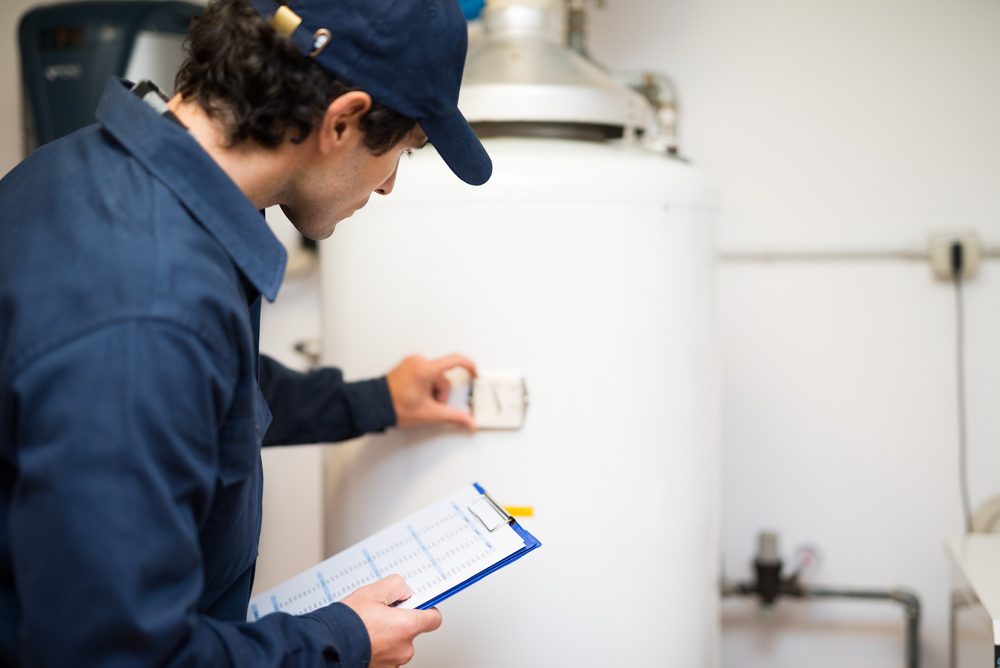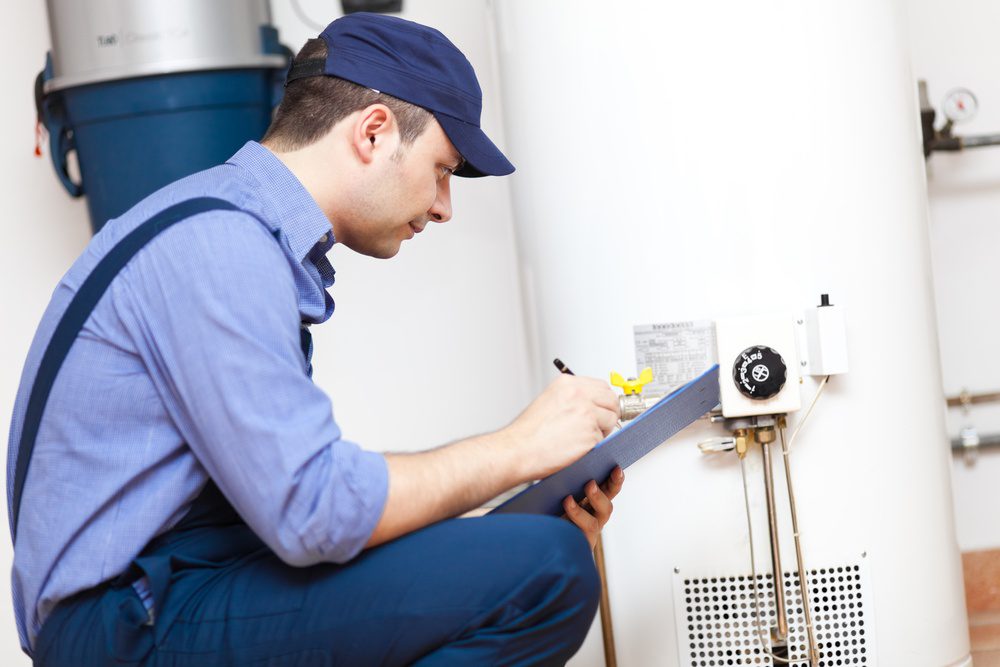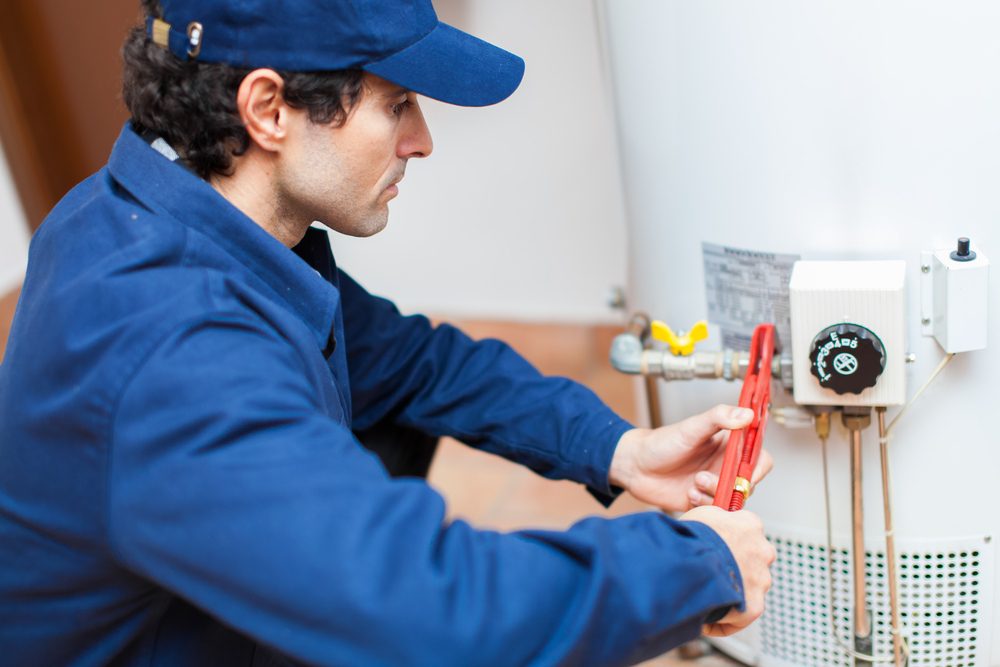
When you discover that your hot water heater is leaking, all you want is a quick, convenient solution before the damage becomes irreversible. The good news is that a licensed plumber can help you with a malfunctioning water heater. Keep reading to learn about the most common water leak causes and how to perform regular maintenance to prevent them.
Table of Contents
Why Is My Hot Water Heater Leaking?
If your hot water heater is leaking, take a look below to see what might be the cause.
1. Old Water Tank
Just like with any other household appliance, water heater tanks wear down as they age. Older water tanks are more susceptible to leaks and lower water retention. Generally, a leaking water tank results from rust buildup that causes internal corrosion. As the inside of the tank corrodes, cracks form that allow water to escape. You can patch the cracks to buy some time, but this is only a temporary fix. Eventually, you’ll need a new unit.
2. Drain Valve
You can use the drain valve on your water heater to empty and clean the tank. This component can become loose as it encounters continuous usage throughout the years. If your hot water heater is leaking, the source of the issue may be a loose drain valve. You may notice a mild water leak due to small openings that weren’t there before. Sometimes a simple tightening will do the trick, but if the valve is loose at the base, you will need to replace it.
Tips & Insights: Where Is the Water Heater Flue Baffle Located?
3. High Pressure
Your water heater will naturally create pressure as it increases the water’s temperature. But too much pressure can cause problems. If excess pressure can’t escape the unit properly, water starts to leak through any cracks that are present.
4. Malfunctioning Temperature & Pressure Relief Valve
The problem above may result from a malfunctioning pressure relief valve. When the internal pressure of your water tank gets too high, the pressure relief valve allows steam to escape the unit and return to a stable temperature. Sometimes the valve just gets loose and needs to be tightened, but if it’s broken, you need to replace it with a new one.

5. Inlet & Outlet Connections
During the heating process, cold water comes into the tank through the inlet connection, and hot water exits through the outlet connection to travel through the pipes in your home. As with drain and pressure relief valves, these connections can loosen over time and cause a water heater leak. If this happens, either try to tighten the connections yourself or call a professional plumber.
6. Tank Interior
Water heaters have two “shells,” an internal shell that contains the water and an external shell that insulates the internal shell. While water leaks coming from the external shell are easy to spot because it’s just covered by a thin metal layer, they’re harder to catch in the internal shell because it’s covered by two layers of material.
7. Collection of Sediment
Here’s why regular water heater maintenance is so important. If you neglect cleaning the tank, sediment builds up at the bottom and eventually causes the unit to crack. The formation of cracks in the tank can cause a mild to severe water heater leak in your home. If the tank starts leaking, all you can do is replace it entirely. So do yourself a favor and clean the water heater tank a few times a year to prevent this from happening. Your wallet will thank you later.
Tips & Insights: How to Get Glass Out of a Garbage Disposal
8. Cracked & Damaged Storage Tank
Some water heaters have a third glass tank that’s susceptible to mineral buildup. Those minerals harden over time and create cracks in the glass that cause water leaks. Again, all you can do to fix this problem is replace the glass tank entirely.
9. Anode Rod
The anode rod can be a life-saver as it removes corrosive components in the water tank. Unfortunately, those components corrode the anode rod so much that it practically disappears. When the anode rod isn’t present to remove corrosive substances, those substances corrode the tank until cracks form and cause water leaks. Thankfully, a simple anode rod replacement will fix the problem.

Average Water Heater Lifespan
On average, water heaters can last up to about 10 years. Depending on the unit’s durability, installation quality, water quality, and climate, this number can vary by a few years.
How To Perform Water Heater Maintenance
While some water heater issues are bound to happen no matter what you do, others are easily preventable with regular maintenance checks. Performing continuous maintenance on your water heater will help prevent deterioration and water leaks. Take a look at our top three water heater maintenance tips that will extend the life of your unit and save you money.
- Empty the water tank twice annually to remove sediment buildup.
- Make sure the pressure relief valve is working properly by lifting and releasing the handle to see if water enters the drainpipe.
- Set the unit’s thermostat to 120 degrees to prevent it from overheating.

Water Heater Repair & Replacement Services
When you find yourself in the middle of a water heater emergency, you need reliable same-day service to give you peace of mind. We offer dependable water heater repair and water heater replacement services for homes in areas such as Delaware, Northeastern Maryland, Southern New Jersey, and Southeastern Pennsylvania.
By providing guaranteed 24-hour customer service and on-time arrivals, our team has been the trusted provider for homeowners for over 30 years. In addition, we offer other types of plumbing services such as water softener installation, sump pump repair, drain cleaning, and water line replacement. When you need a company you can count on to provide top-notch water heater repair and replacement services, call the professionals on our team at 1-800-642-4419.


